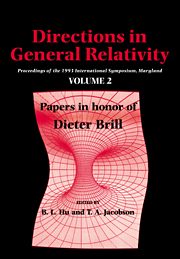 Directions in General Relativity
Directions in General Relativity Published online by Cambridge University Press: 06 January 2010
Abstract
We analyze the degree of equivalence between abelian topologically massive, gauge-invariant, vector or tensor parity doublets and their explicitly massive, non-gauge, counterparts. We establish equivalence of field equations by exploiting a generalized Stueckelberg invariance of the gauge systems. Although the respective excitation spectra and induced source-source interactions are essentially identical, there are also differences, most dramatic being those between the Einstein limits of the interactions in the tensor case: the doublets avoid the discontinuity (well-known from D=4) exhibited by Pauli—Fierz theory.
It is a pleasure to dedicate this work to Dieter Brill on the occasion of his 60th birthday. I have learned much from him over the years, not least during our old collaborations on general relativity. I hope he will be entertained by these considerations of related theories in another dimension.
Introduction
Perhaps the most paradoxical feature of topologically massive (TM) theories [1, 2] is that their gauge invariance coexists with the finite mass and single helicity, parity violating, character of their excitations. This phenomenon, common to vector (TME) and tensor (TMG) models, is special to 2+1 dimensions because in higher (odd) dimensions the operative Chern—Simons (CS) terms are of at least cubic order in these fields and so do not affect their kinematics; only higher rank tensors could acquire a topological mass there.
To save this book to your Kindle, first ensure [email protected] is added to your Approved Personal Document E-mail List under your Personal Document Settings on the Manage Your Content and Devices page of your Amazon account. Then enter the ‘name’ part of your Kindle email address below. Find out more about saving to your Kindle.
Note you can select to save to either the @free.kindle.com or @kindle.com variations. ‘@free.kindle.com’ emails are free but can only be saved to your device when it is connected to wi-fi. ‘@kindle.com’ emails can be delivered even when you are not connected to wi-fi, but note that service fees apply.
Find out more about the Kindle Personal Document Service.
To save content items to your account, please confirm that you agree to abide by our usage policies. If this is the first time you use this feature, you will be asked to authorise Cambridge Core to connect with your account. Find out more about saving content to Dropbox.
To save content items to your account, please confirm that you agree to abide by our usage policies. If this is the first time you use this feature, you will be asked to authorise Cambridge Core to connect with your account. Find out more about saving content to Google Drive.